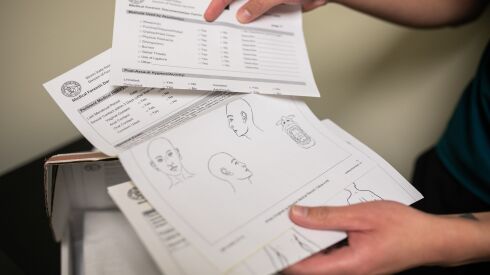
A nurse at Howard Brown Health shows forms that were part of a rape kit that was used for training purposes at Howard Brown Health in the Buena Park in 2021. Howard Brown Health had been temporarily administering rape kits, which was permitted by a change in the Sexual Assault Survivors Emergency Treatment Act in June 2020.
Pat Nabong/Sun-Times
Every year, the Illinois Criminal Justice Information Authority distributes federal Victims of Crime Act (VOCA) funds to victim services across the state. These funds comprise deposits from criminal fines, penalties, forfeited bail bonds and special assessments collected by the federal government. Unfortunately, these funds are now severely reduced due to reduced prosecution of white-collar crimes.
Survivors of sexual violence in Illinois are set to pay the price.
Because of VOCA cuts, Illinois rape crisis centers are facing the loss of $9.5 million in funding, effective July 1 — a reduction of over 50% from current funding levels. While other victim services’ funds will also be reduced, these cuts are especially devastating to sexual violence services because of Illinois’ historic underinvestment. In the last 20 years, Illinois has increased funding for rape crisis services by just $2 million, an amount that falls short in keeping up with rising workforce costs and inflation.
An increase in state funds is long overdue. With devastating VOCA cuts looming, Illinois must increase its investment in rape crisis centers to avoid catastrophic consequences for survivors and the state’s economy.
Without more state funds, rape crisis centers will have to make drastic changes in services, or eliminate services altogether. According to the Illinois Coalition Against Sexual Assault (ICASA), 78% of Illinois’ rape crisis centers are expected to reduce staff, 72% will have to create a waiting list for counseling, and 40% will be forced to close their doors. Our Chicagoland centers will likely have to forego hiring to fill critical therapist and advocacy vacancies.
Dire consequences without action
Sexual violence is common: Over 50% of women have experienced sexual violence with physical contact in their lifetime. Moreover, one in four women, and one in 26 men, report being victims of rape or attempted rape in their lifetime. In Illinois, 21,198 survivors received services at rape crisis centers between July 1, 2021, and June 30, 2022, according to ICASA. The greater Chicago area’s six crisis centers provided services to 3,841 survivors during that same period. Since over 60% of the survivors our centers served identified as Black or Hispanic, any loss of funding will disproportionately impact communities of color that already experience a lack of resources and investment.
Families, businesses and the health care system will also face unintended costs. The estimated lifetime cost of rape is over $122,000 per survivor, which means a nationwide economic burden of over $3.1 trillion in 2014 dollars. Without fully funded sexual violence services, the incomes of survivors and their families will plummet because of unpaid leave needed to deal with unaddressed mental and physical health care — and these workforce shortages will also take a toll on businesses. And without the support of trained advocates, health care providers will become the primary resource for survivors, leading to increased burnout and turnover, especially in underserved communities.
Without state action, rape crisis centers will have to divert their already-stretched staff and resources to fundraising and chasing down grants.
Alongside ICASA, we are asking for a $12 million increase in general revenue funds for rape crisis centers, bringing the total to $20 million.
The increase will not only fill the gap created by the VOCA reductions, but also address rising workforce costs and inflation. Human service worker turnover is exceptionally high, usually between 30% and 50%, and most workers leave because of low wages and high stress. Our centers need to be able to attract and retain a diverse, talented workforce that can meet survivors’ complex needs.
Survivors, families, and communities deserve better than the currently proposed budget. Illinois legislators must do better, by increasing investment in sexual violence services in the 2024 budget and all budgets going forward.
Nicole R. Robinson is the CEO of YWCA Metropolitan Chicago.
Co-authors of this op-ed are: Angela Curran, president and CEO of Pillars Community Health; Carrie Estrada, executive director of Northwest Center Against Sexual Assault; Sarah Layden, chief operating officer and interim co-director of Resilience; Linda X. Tortolero, president and CEO of Mujeres Latinas en Acción; Sandy T. Williams, executive director of the Zacharias Sexual Abuse Center.
The Sun-Times welcomes letters to the editor and op-eds. See our guidelines.
The views and opinions expressed by contributors are their own and do not necessarily reflect those of the Chicago Sun-Times or any of its affiliates.
from Chicago Sun-Times - All https://ift.tt/LzUGtKT

No comments:
Post a Comment